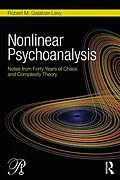Nonlinear concepts from chaos theory, complexity studies and fractal geometry have transformed the way we think about the mind. Nonlinear Psychoanalysis shows how nonlinear dynamics can be integrated with psychoanalytic thinking to shed new light on psychological development, therapeutic processes and fundamental psychoanalytic concepts. Galatzer-Levy brings an unusual combination of training in psychiatry, psychoanalysis and mathematics to this unique study, which summarizes his 40 years of exploration of nonlinearity and psychoanalysis. Nonlinear Psychoanalysis will appeal to psychoanalysts and psychotherapists as well as students of nonlinear dynamics systems.
Autorentext
Robert M. Galatzer-Levy is a clinical professor of psychiatry and behavioral neuroscience at the University of Chicago and a faculty member of the Chicago Institute for Psychoanalysis. He practices child, adolescent, and adult psychoanalysis and psychiatry in Chicago.
Klappentext
Nonlinear concepts from chaos theory, complexity studies, and fractal geometry have transformed the way we think about the mind. Nonlinear Psychoanalysis shows how nonlinear dynamics can be integrated with psychoanalytic thinking to shed new light on psychological development, therapeutic processes, and fundamental psychoanalytic concepts.
Starting with a personal history of the author's engagement with nonlinear dynamics and psychoanalysis, this book describes how his approach applies to diagnosis of psychological conditions, concepts of normal and pathological development, gender, research methods, and finally the theory and practice of psychoanalysis and psychodynamic psychotherapy. This book is full of new ideas about the basic nonlinear processes of human development, nonlinear views of gender and fundamental psychoanalytic process like working through, and the nature of the therapeutic process as conceptualized in terms of the theory of coupled oscillators. Galatzer-Levy questions many standard psychoanalytic formulations and points to a freer practice of psychoanalysis and psychoanalytic thinking. His new approach opens the reader's eyes to ways in which development and treatment can occur through processes not now included in standard psychoanalytic theory. The book not only provides useful theories but also helps readers take note of commonly passed over phenomena that were unseen for lack of a theory to explain them.
Galatzer-Levy brings an unusual combination of training in psychiatry, psychoanalysis, and mathematics to this unique study, which summarizes his forty years of exploration of nonlinearity and psychoanalysis. Nonlinear Psychoanalysis will appeal to psychoanalysts and psychotherapists as well as students of nonlinear dynamics systems.
Inhalt
Introduction: Mathematics, Psychoanalysis and the Human Sciences
Chapter 1 A First Step - Qualitative Change from Quantitative Change:
Catastrophe Theory Psychoanalysis
Chapter 2 Characterizing Our Ignorance
Chapter 3 Chaotic Possibilities: Toward a New Model of Development
Chapter 4 An Example of Nonlinear Developmental Thinking
Chapter 5 Good Vibrations: Analytic Process as Coupled Oscillations
Chapter 6 Inexact Interpretations and Coupled Oscillators
Chapter 7 Prediction and Self Similarity
Chapter 8 Emergence
Chapter 9 On Working Through: A Model from Artificial Intelligence
Chapter 10 The Nonlinear Clinician at Work on the Edge of Chaos
Chapter 11 Afterwards and Forwards
